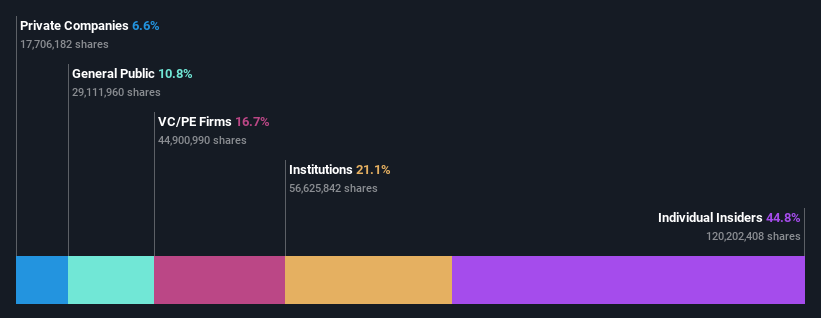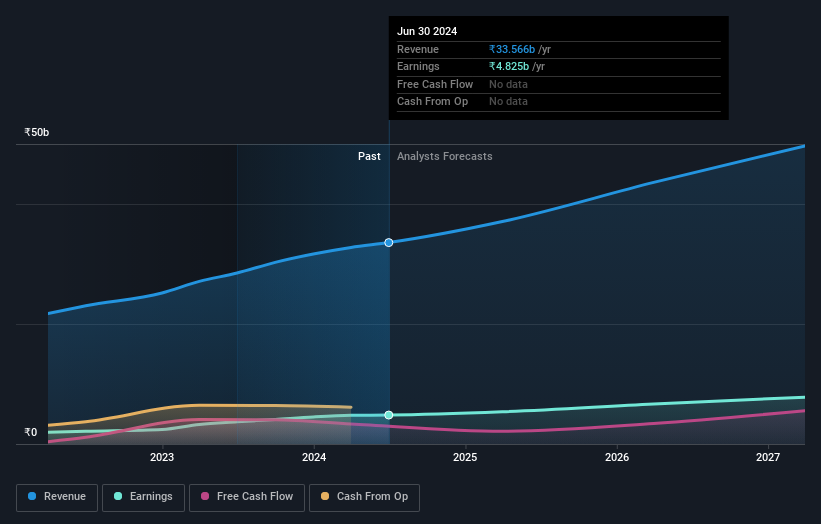- India
- /
- Healthcare Services
- /
- NSEI:MEDANTA
Following recent decline, Global Health Limited's (NSE:MEDANTA) top shareholder Top Key Executive Naresh Trehan sees holdings value drop by 3.1%
Key Insights
- Global Health's significant insider ownership suggests inherent interests in company's expansion
- A total of 3 investors have a majority stake in the company with 61% ownership
- 21% of Global Health is held by Institutions
To get a sense of who is truly in control of Global Health Limited (NSE:MEDANTA), it is important to understand the ownership structure of the business. And the group that holds the biggest piece of the pie are individual insiders with 45% ownership. Put another way, the group faces the maximum upside potential (or downside risk).
And following last week's 3.1% decline in share price, insiders suffered the most losses.
Let's take a closer look to see what the different types of shareholders can tell us about Global Health.
Check out our latest analysis for Global Health

What Does The Institutional Ownership Tell Us About Global Health?
Institutional investors commonly compare their own returns to the returns of a commonly followed index. So they generally do consider buying larger companies that are included in the relevant benchmark index.
Global Health already has institutions on the share registry. Indeed, they own a respectable stake in the company. This can indicate that the company has a certain degree of credibility in the investment community. However, it is best to be wary of relying on the supposed validation that comes with institutional investors. They too, get it wrong sometimes. When multiple institutions own a stock, there's always a risk that they are in a 'crowded trade'. When such a trade goes wrong, multiple parties may compete to sell stock fast. This risk is higher in a company without a history of growth. You can see Global Health's historic earnings and revenue below, but keep in mind there's always more to the story.

Global Health is not owned by hedge funds. From our data, we infer that the largest shareholder is Naresh Trehan (who also holds the title of Top Key Executive) with 33% of shares outstanding. Its usually considered a good sign when insiders own a significant number of shares in the company, and in this case, we're glad to see a company insider play the role of a key stakeholder. In comparison, the second and third largest shareholders hold about 17% and 12% of the stock. Interestingly, the third-largest shareholder, Sunil Sachdeva is also a Member of the Board of Directors, again, indicating strong insider ownership amongst the company's top shareholders.
A more detailed study of the shareholder registry showed us that 3 of the top shareholders have a considerable amount of ownership in the company, via their 61% stake.
While studying institutional ownership for a company can add value to your research, it is also a good practice to research analyst recommendations to get a deeper understand of a stock's expected performance. Quite a few analysts cover the stock, so you could look into forecast growth quite easily.
Insider Ownership Of Global Health
The definition of company insiders can be subjective and does vary between jurisdictions. Our data reflects individual insiders, capturing board members at the very least. Company management run the business, but the CEO will answer to the board, even if he or she is a member of it.
Insider ownership is positive when it signals leadership are thinking like the true owners of the company. However, high insider ownership can also give immense power to a small group within the company. This can be negative in some circumstances.
Our most recent data indicates that insiders own a reasonable proportion of Global Health Limited. Insiders own ₹132b worth of shares in the ₹294b company. That's quite meaningful. Most would say this shows a good degree of alignment with shareholders, especially in a company of this size. You can click here to see if those insiders have been buying or selling.
General Public Ownership
The general public, who are usually individual investors, hold a 11% stake in Global Health. While this size of ownership may not be enough to sway a policy decision in their favour, they can still make a collective impact on company policies.
Private Equity Ownership
Private equity firms hold a 17% stake in Global Health. This suggests they can be influential in key policy decisions. Some might like this, because private equity are sometimes activists who hold management accountable. But other times, private equity is selling out, having taking the company public.
Private Company Ownership
It seems that Private Companies own 6.6%, of the Global Health stock. It might be worth looking deeper into this. If related parties, such as insiders, have an interest in one of these private companies, that should be disclosed in the annual report. Private companies may also have a strategic interest in the company.
Next Steps:
It's always worth thinking about the different groups who own shares in a company. But to understand Global Health better, we need to consider many other factors.
I like to dive deeper into how a company has performed in the past. You can access this interactive graph of past earnings, revenue and cash flow, for free.
Ultimately the future is most important. You can access this free report on analyst forecasts for the company.
NB: Figures in this article are calculated using data from the last twelve months, which refer to the 12-month period ending on the last date of the month the financial statement is dated. This may not be consistent with full year annual report figures.
New: Manage All Your Stock Portfolios in One Place
We've created the ultimate portfolio companion for stock investors, and it's free.
• Connect an unlimited number of Portfolios and see your total in one currency
• Be alerted to new Warning Signs or Risks via email or mobile
• Track the Fair Value of your stocks
Have feedback on this article? Concerned about the content? Get in touch with us directly. Alternatively, email editorial-team (at) simplywallst.com.
This article by Simply Wall St is general in nature. We provide commentary based on historical data and analyst forecasts only using an unbiased methodology and our articles are not intended to be financial advice. It does not constitute a recommendation to buy or sell any stock, and does not take account of your objectives, or your financial situation. We aim to bring you long-term focused analysis driven by fundamental data. Note that our analysis may not factor in the latest price-sensitive company announcements or qualitative material. Simply Wall St has no position in any stocks mentioned.
About NSEI:MEDANTA
Flawless balance sheet with moderate growth potential.
Market Insights
Community Narratives



